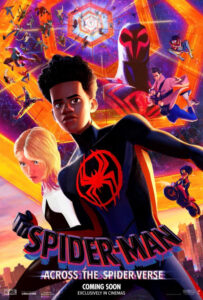Spider-Man: Across the Spider-Verse
Reviewed by Tony Keen 07-Jun-23
Spider-Man: Across the Spider-Verse is good; we’d never deny that. But it has an impossible task in living up to its predecessor.
 Directed by Joaquim Dos Santos, Kemp Powers, and Justin K. Thompson, screenplay by Phil Lord & Christopher Miller and Dave Callaham.
Directed by Joaquim Dos Santos, Kemp Powers, and Justin K. Thompson, screenplay by Phil Lord & Christopher Miller and Dave Callaham.
The biggest problem Spider-Man: Across the Spider-Verse has to face is the weight of expectation drawing from its predecessor. Into the Spider-Verse was fresh and innovative. It was only the second modern superhero movie to have a black lead (after Black Panther). Through its use of manga and anime influences, the movie transposed a comic page to a moving image more successfully than any other western superhero film. It also introduced the idea of the multiverse rather more successfully than the Marvel Cinematic Universe did. It is widely, and rightly in our view, seen as the best Spider-Man movie, and one of the best of all Marvel movies and one of the best of all superhero movies.
Across the Spider-Verse can’t do much of that freshness and innovation, because it’s already been done. All it can really provide is more of the same. And so it does, literally. At 140 minutes, this is the longest western animated feature ever, though it feels shorter than recent MCU products. And this is only part one of the story (something that disappointed a section of the audience when I saw it, who evidently weren’t aware).
 It helps that some of the more is stuff that we do want to see more of, such as Hailee Steinfeld’s Spider-Gwen, whose background gets fleshed out. Indeed, where the relationship between Miles Morales and Peter B. Parker was at the heart of the first movie, that between Miles and Gwen is key to this one. We also get more of Miles’ mother, Rio, which is nice.
It helps that some of the more is stuff that we do want to see more of, such as Hailee Steinfeld’s Spider-Gwen, whose background gets fleshed out. Indeed, where the relationship between Miles Morales and Peter B. Parker was at the heart of the first movie, that between Miles and Gwen is key to this one. We also get more of Miles’ mother, Rio, which is nice.
Emotionally, the movie hits the mark well. The characterisations are well drawn, and believable, especially those around Miles and his immediate family. This is a well-written movie.
Sometimes, however, more rolls over into too much, as in the case of the hundreds of Spiders encountered at multiversal headquarters. And the action sequences can sometimes be hard to follow.
There are some innovations. There’s a lot of use of footnotes, as Marvel Comics have always used. A lot of these pass quite quickly, and one feels that the creators have deliberately set up some sequences to be pored over by people with a pause button. Different art styles are used for different universes, something that comes across most effectively in a scene between Gwen and her father. There is also some integration of live action—Donald Glover’s Aaron Davis from Spider-Man: Homecoming is briefly seen, as are Mrs Chen from Venom, and the Andrew Garfield and Tobey Maguire incarnations of Peter Parker. There are a few clever twists and turns, and an in-multiverse explanation for why Spider-Man stories tend to hit the same beats.
But none of these, in my view, have the same impact as the best bits in Into the Spider-Verse. No moment here has the sheer chutzpah of introducing Peter Porker, the Spectacular Spider-Ham. Sure, there’s a moment with the Lego Spider-Man, but that’s over and done with pretty quickly, and it never feels as bold as the Peter Porker moment, precisely because the first movie has already done something that bold.
Instead, occasionally it seems as if the clever bits of fanservice (and there’s a lot of fanservice here) are there for their own sake, rather than serving the purposes of the story. There’s also a feeling that some of the sense of fun of the first movie has been lost; it’s there at the beginning of Across the Spider-Verse, but then dissipates, as the movie becomes rather grimmer.
None of which is to say that Across the Spider-Verse is a bad movie. Indeed, it’s a superior example of the superhero genre, much, much better than, say, Doctor Strange in the Multiverse of Madness (which gets a brief nod in a line of dialogue). It’s still doing the multiverse better than the MCU. You should definitely go and see this (and I know others have been much more enthusiastic about it than me). But, for me, it is not the genre-redefining masterpiece that its predecessor was. It simply can’t be. As a consequence, I doubt I shall be revisiting this as often as I revisit Into the Spider-Verse.
Tags: Marvel, Miles Morales, Sony, Spider-Gwen, Spider-Man